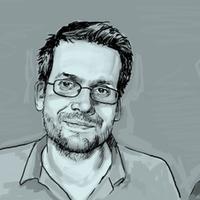14. The Education Continuum WARNER CHILCOTTED
14. The Education Continuum WARNER CHILCOTTED
Good morning Hank; it's Wednesday, May 18th, 2011, also known as Button Your Button Day. Hank, in the last 24 hours I finished the big revision of my novel and I also watched your poetic commencement address, and it made me think a lot about education and why we're alive and stuff. Right, so when we think about education we often think about a soft/hard continuum. On the far edge of hard, you have mathematics which, you know, there's only one right answer, and everything's about numbers and data. And then on the far edge of the soft side you have the study of literature, where everything's about, you know, what it means to be a person in a world full of other people and how to understand ourselves in history and all that boring stuff. You know what I'm talking about, Hank: history's pretty soft, physics is pretty hard, biology is somewhere in the middle because, you know, it involves adorable baby pigs but they're dead and you have to dissect them. Psychology thinks that it's hard but it's actually soft; economics thinks that it's soft but it's actually hard, you know what I'm talking about! Right, except in my opinion, Hank, that continuum is complete and utter... Warner Chilcott. So Hank, when you study mathematics, you're really studying two things: first you're studying mathematical language. So the simplest kind of mathematical language is that when we talk about the number seven we're not only talking about seven donuts or seven pairs of pants, we're talking about the abstracted idea of seven. And then when you get to algebra, the language of mathematics suddenly involves letters. And the language of math gets more and more complex as you learn, which is why, when I read something by Brotherhood 2.0 Resident Mathematician Daniel Biss, I feel illiterate.
So that's the first thing you're doing when you study math. The second thing is that you're attempting to understand the universe, right? I mean, I don't want to overstate the matter, but that's basically what we're doing. Ultimately, the reason that we have to know that the square root of four is two is because it helps us to build cathedrals and think about space and make out with people, but more on that in a second.
Right, so we study math for the twin reasons of wanting to learn mathematical language and wanting to understand our place in the universe, which turns out to be precisely why we also study literature: to learn about language and to understand our place in the universe. Which by the way, Hank, gets to the thing that make me angriest in the entire world, which is when people say that there is only one right answer in math, but that every answer is equally correct in literature. That's just bunk! First off, there is often more than one correct answer in math, and secondly NOT EVERY ANSWER IS EQUALLY CORRECT IN LITERATURE! I am a giant squid of anger! For instance, Hank, if you think that The Adventures of Huckleberry Finn is a pro-slavery novel, you're wrong! You're as wrong as you are if you think that the square root of four is strawberries! Right, so students of the world, I want you to look at me for a second. Most of the questions that you're asking in your literature classes are not that interesting. Like the question of whether the author intended that symbol or that metaphor- let me tell you, as an author who intends symbols and metaphors- that question is not interesting.
It doesn't matter if, when I was writing Paper Towns, I wanted the Great White Wall of Cow to reference the Great White Wall of Whale in Moby Dick. The Great White Wall of Cow and/or Whale isn't there for you to think about authorial intent, it's there for you to think about nature's seemingly absolute apathy toward individual humans and what the heroic response to that apathy is. And the reason that reading critically, like reading for theme and metaphor and symbol is important is because those things are ways in to the big, interesting questions, many of which are same questions that math is trying to answer.
Hank, the vast majority of us imagine ourselves as like literature people or else as like math people. But the truth is that the massive parallel processor known as the human brain is neither a literature organ or a math organ. It is both and more.
Hank, putting aside learning for learning's sake, I'd argue that understanding the universe and its inhabitants is helpful in pretty much every human endeavor, which is why nerds, in my experience, are more likely to understand special relativity and also more likely to be good at kissing. So math people, let me tell you that imaginary stories can be every bit as intellectually engaging as imaginary numbers. And literature people, I am here to tell you that set theory is every bit as fascinating and moving and beautiful as the Great Gatsby.
Hank, I'll see you on Monday. Is it Friday? No, it's Wednesday, isn't it. Hank, I'll see you on Friday. God, I'm so bad at days! But really Hank, are days of the week math or literature? They're both.

